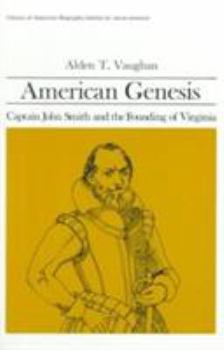American Genesis: Captain John Smith and the Founding of Virginia (Library of American Biography Series)
(Part of the Library of American Biography Series and Library of American Biography Series)
Select Format
Select Condition 
Book Overview
This text is American Genesis. about the famous captain John Smith and his role in the founding of Virginia. This description may be from another edition of this product.
Format:Paperback
Language:English
ISBN:0673393550
ISBN13:9780673393555
Release Date:January 1997
Publisher:Pearson
Length:224 Pages
Weight:0.45 lbs.
Dimensions:0.4" x 5.0" x 7.7"
Customer Reviews
2 ratings
The early history of Virginia Colony
Published by Thriftbooks.com User , 19 years ago
The eventual success of the British colonial establishment in America belied its inauspicious beginnings. Failing twice in the 16th century, it was only with the establishment of Jamestown in 1607 that the English succeeded in placing a permanent settlement in the New World - and even this nearly failed on a number of occasions. Its success can be attributed in part to John Smith, one of the leaders of the expedition and the subject of Alden Vaughan's book. Smith's early life proved adventurous. Growing up during the age of Elizabethan heroics, he inherited its adventurous spirit, and as a young man served as a mercenary in Continental armies. His return to England coincided with the renewed interest in colonizing the New World, and he soon was recruited for the London Company's exhibition to Chesapeake Bay. Vaughan notes the tensions created by Smith's selection, which as a yeoman was resented by the aristocrats that had signed on in the hope of winning vast wealth for themselves. This resentment soon emerged on the voyage to America, as an effort to discredit him temporarily cost him his role on the governing board. After reaching Jamestown, he soon emerged as the principal negotiator with the leader of the local Indians, Powhatan. Though Smith made a favorable impression with Powhatan, this did little to mitigate the hostility that quickly emerged between the two groups, which was just one of the many problems the early colony faced. Vaughan states that in the early years of the colony's existence, the only time that it met the basic needs of survival - political stability, economic prosperity, and peaceful relations with the Indians - was during Smith's tenure as its president. With his departure from Virginia, Smith retreats to the sidelines, making only sporadic appearances until the final chapter of the book. Instead, the focus shifts to the colony itself, which continued to struggle to survive. It was only when Powhatan agreed to a peace treaty and tobacco cultivation was introduced that the colony's immediate was assured. But long-term viability was dependent upon creating a stable society, which led the company to encourage more women to emigrate. Though by the early 1620s the company's directors were optimistic about their colony's future, the devastating attack on the colony by the Indians in March 1622, coupled with infighting among the directors in London, doomed the Virginia Company and precipitated a takeover of the colony by the crown in 1624. Vaughan tells this story well. While a little dated (his examination of the slaves' condition is in need of some revision), he conveys the development of the colony briskly and succinctly. Readers seeking a greater focus on the fascinating life of John Smith would do well to reference the biographies he lists in his bibliography; for those seeking a good introduction to his life or a survey of the early years of the Virginia Colony, this is the book to read.
Founding of Virginia
Published by Thriftbooks.com User , 20 years ago
This book is written in the style of an "historical account of happenings." I thoroughly enjoyed the first half of the book which told of John Smith's early adventures and his coming to America then setting up the first English colony. The second half of the book however, did not include John Smith himself, just his policies and ideals. The latter part of the book told of many subsequent men who headed Virginia and how their successes were based on John Smith's early ideals and requests (usually not met by England or the colonists of his era). It is a good book for study with the first half being the better read. PS. Students can get all the information they need on the founding of Virginia by reading only half of the book's 190 pages.





